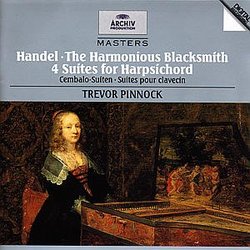| All Artists: Trevor Pinnock Title: Handel: Harmonious Blacksmith, 4 Suites Members Wishing: 0 Total Copies: 0 Label: Deutsche Grammophon Release Date: 11/23/2001 Album Type: Import Genre: Classical Styles: Forms & Genres, Suites Number of Discs: 1 SwapaCD Credits: 1 UPC: 028944729023 |
Search - Trevor Pinnock :: Handel: Harmonious Blacksmith, 4 Suites
 | Trevor Pinnock Handel: Harmonious Blacksmith, 4 Suites Genre: Classical
|
Larger Image |
CD Details |
CD ReviewsPRIVATE FACE DAVID BRYSON | Glossop Derbyshire England | 03/28/2005 (5 out of 5 stars) "Handel was a genius and creature of the limelight. In his day he was the most famous keyboard performer in all Europe, but his renown in that respect was for his powers of improvisation, which by all accounts were phenomenal. He seemed to have little or no interest in formal compositions in this medium, except for purposes of the teaching that he did sporadically at various stages of his career. Competent recent research into this side of his work reveals that his teaching methods were actually extremely methodical and quite original and independent-minded too, but it would not have occurred to Handel to put his grandest inspirations into his pedagogical works. These are fluent and attractive, and of course the great authentic voice retains its identity even when he is not troubling to raise it. The scope and purpose of these background compositions may be comparatively modest, but Handel is still Handel, not Hanon or Czerny or Moscheles.
This selection offers us four of the keyboard suites, plus a chaconne in G, plus the Harmonious Blacksmith variations themselves. The suites are highly varied in content. The technical demands they make are only moderate, but they are not beginners' pieces either, and they can make quite an effect when the player is up to them. That Trevor Pinnock is far more than up to them goes without saying, but I imagine that it must have done not a little for the motivation of the great man's pupils to be given the opportunity to sound so imposing before their technique had necessarily reached a fully advanced stage. Some fleet fingerwork is predictably called for, especially in the gigues however spelt. In the E minor suite we have a `jigg' bearing the extraordinary time-signature 24/16 -- i.e. 8 beats to the bar. I'm not sure that my own sense of timing stretches beyond 4 beats to any bar, which is how I would have beaten time to this piece if I had not known, and I'm therefore not sure I have entirely grasped the composer's intention. The Air in the D minor suite is clearly intended to provide an exercise in ornamentation by the player, and the prelude to that in B flat likewise to serve as a basis for the pupil to practise larger-scale improvisation on the outline Handel provides. It did cross my mind that Pinnock might have been a bit more adventurous here, as I'm sure, say, Britten would have been, but I could of course be wrong. Another feature of interest is that the theme for variations in the B flat suite is none other than the one that Brahms used in his great independent masterpiece for piano. Pinnock dispatches it all like the maestro he is. I wondered whether his changes of registration were perhaps a trifle tame. However I do not press this point - I'm an enthusiast for Malcolm, whose practice in this respect verges on garish to some ears, indeed possibly to mine, except that I like it that way. What matters more is the deeply ingrained sense of style that such an expert possesses, and the idiomatic vigour and panache that he displays. The instrument used is actually considerably older than Handel himself, a Flemish build upgraded in the 18th century. For the loan of this instrument we are indebted to no less than Her Britannic Majesty, whose musical insight I trust has benefited from the example of Handel as her own forebears' did in their own time." |

 Track Listings (20) - Disc #1
Track Listings (20) - Disc #1